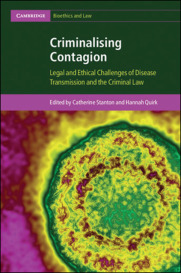当前位置:
X-MOL 学术
›
Lancet Infect Dis
›
论文详情
Our official English website, www.x-mol.net, welcomes your
feedback! (Note: you will need to create a separate account there.)
Criminalising transmission of infections
The Lancet Infectious Diseases ( IF 36.4 ) Pub Date : 2017-11-01 , DOI: 10.1016/s1473-3099(17)30589-3 George Mawhinney
The Lancet Infectious Diseases ( IF 36.4 ) Pub Date : 2017-11-01 , DOI: 10.1016/s1473-3099(17)30589-3 George Mawhinney

|
In their new work Criminalising Contagion: Legal and Ethical Challenges of Disease Transmission and the Criminal Law, Catherine Stanton and Hannah Quirk reiterate the existing orthodoxy that criminalising contagion is bad. In a nutshell, doing so makes ill people's lives more onerous, and stigmatises illness, deterring those who suspect they might be afflicted, from getting diagnosed and thereupon treatment, and incentivising them to continue, officially at least, as uninfected. Their officially uninfected status thus frees them from the burdens of disclosure and liabilities that might attach to their desired actions, were they indeed known to be suffering with a condition.
中文翻译:

将传播感染定为刑事犯罪
凯瑟琳·斯坦顿(Catherine Stanton)和汉娜·奎克(Hannah Quirk)在他们的新著作《将传染定为刑事犯罪:疾病传播和刑法的法律和道德挑战》中,重申了现有的正统观念,即将传染定为犯罪是有害的。简而言之,这样做会使患病的人的生活更加繁重,并给人以耻辱感,阻止那些怀疑自己可能会受到折磨的人得到诊断并立即接受治疗,并激励他们至少在官方上继续受到未感染的威胁。因此,如果他们的确未患病,他们的正式未感染状况便使他们摆脱了可能因其期望的行为而承担的信息披露负担和责任。
更新日期:2017-10-26
中文翻译:

将传播感染定为刑事犯罪
凯瑟琳·斯坦顿(Catherine Stanton)和汉娜·奎克(Hannah Quirk)在他们的新著作《将传染定为刑事犯罪:疾病传播和刑法的法律和道德挑战》中,重申了现有的正统观念,即将传染定为犯罪是有害的。简而言之,这样做会使患病的人的生活更加繁重,并给人以耻辱感,阻止那些怀疑自己可能会受到折磨的人得到诊断并立即接受治疗,并激励他们至少在官方上继续受到未感染的威胁。因此,如果他们的确未患病,他们的正式未感染状况便使他们摆脱了可能因其期望的行为而承担的信息披露负担和责任。











































 京公网安备 11010802027423号
京公网安备 11010802027423号